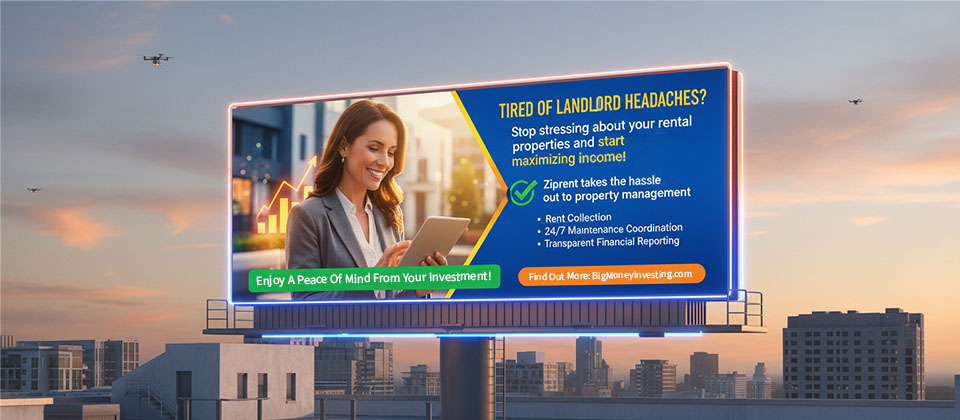MAKE MONEY WITH NO MONEY WITH ROBERT KIYOSAKI, RICH DAD POOR DAD -Robert Kiyosaki
Video Transcript
Welcome to Big Money Investing
Your Ultimate Destination for Learning From Big Money and How You Can Succeed Too!
Are you ready to take it to the next level?
Investing into sound investments like big money does. Subscribe to the Big Money Investing Channel
(upbeat music) – Hey guys, welcome to Advanced Lessons in Millennial Money featuring Robert Kiyosaki. I’m Alexandra Gonzalez. In this episode, I got a chance to speak with Robert Kiyosaki and his real estate expert and Rich Dad advisor, Ken McElroy. For over two decades, Ken McElroy has experienced massive success in the real estate world from investment analysis and property management to acquisitions and property development. With over 750 investment dollars in real estate, Ken offers a unique perspective in how to get the biggest return on your investment. One of the topics Robert talks about is using debt to get rich. We get a lot of questions about how that actually works. Let’s listen to how Ken and Robert pull this off. – So, Kenny, you wanna say anything about the beauties of debt and how you learn to use debt to get rich? – Sure, sure, well I think when I was your age, everybody just said stay out of debt. So, it wasn’t until later that I realized that you can use it and you can use it to buy assets. So, it’s a big difference, doing good debt and bad debt, but essentially, all it is, it’s a form of money from somebody to buy something in a loan or a mortgage or whatever you wanna call it. So, it’s just money. And so, being able to use money from a bank or from a life company or a pension or something like that. – Or an investor like me. – Yeah, or an investor. In the form of a loan or equity is the most important thing that you could learn because I think I certainly grew up with no money and my parents didn’t either and we always used to have to save for everything that we always did, it was always how much money can we save and then we can buy something and it wasn’t until later that I realized that when you use debt, you can actually do it, you don’t even have to have any money. You just use other people’s money. – When you go to the bank and ask to borrow money, your bank is going to consider how much debt you can have based on net operating income or NOI. Not sure what that means? Let’s listen to Ken explain. – NOI means net operating income, so if you really think about it, it’s just income minus expenses. That’s all it is. And so, it’s important to know where you are financially, so a banker’s gonna look at your income after expenses so that’s a great way to see it. – It’s really quite simple. So let’s say, I’ll keep the numbers simple. You have a thousand dollars income and you have 500 dollars in expenses, this is a prop. – Yep, so you have a 500 dollar NOI or net operating income. – So why is that important? – Well, the banker looks at that number because that’s the number that they see to be able to pay back any debt you might want. – [Robert] Right, this is where this comes in, right? – Correct. So, they’re gonna look here and they’re gonna say, okay this person has 500 dollars in NOI, therefore we can give them a loan, say up to 350 dollars, 250 dollars or something like that. So, they’re not gonna give you a loan for the whole amount because they don’t want you to be that tight, so what they’re gonna do is they’re gonna look at the NOI and say, how much can we loan you? – Now that we’ve learned about debt and NOI, what role does the property play when seeking funding for the investment? Robert and Ken discuss. – Okay, so when Kenny calls me and says, I have this property. It’s in horrible condition, there’s no income, there’s expenses all over the place, you get excited right? – Yeah, so I do. It can work the opposite too. So a lot of people get hung up here because they don’t have a financial statement or any way to go to a banker, let’s say, but sometimes a banker will look at the property itself. So they’ll say, like the one you explained, they’ll say well this has a bad NOI on it, why would we give you money? You know what I mean? And so that’s when the financial education comes in and you say, well this is what I plan to do with it. – Correct, what Kenny is saying, we’ve had, I’m keeping the numbers simple. He’s had income of zero and this is a thousand. – Yeah, so you’d have a negative NOI. – And the banker goes, tell me why. – I can’t lend on that, right? Because it’s a higher risk of being able to be paid back. – My next question was how can you use NOI to determine the value of a property when you’re looking to invest? Let’s watch. So how can you use NOI to determine the value of a property, of an investment property? – So, the NOI or the net operating income determines the value. What you back into it with another vehicle called a capitalization rate or cap rate, so it’s actually, we’re getting a little technical, but typically, the cap rate or capitalization rate divided into the NOI determines the price. So that’s generally how that works. But in the case that we were talking about, the value of the building with no tenant in it – Is way low. – Is way low. And there’s really no income. So it’s basically whatever the structure is. So I’ve seen lots of situations where a vacant building, somebody might’ve spent five, ten million dollars on a building that’s completely vacant, vacant warehouses, vacant whatevers, right? Sometimes you see ’em get converted into clubs or whatever. Well, there’s value there. Somebody spent a lot of money on it at one time. Somebody owns it, too. It could be a bank, it could be whatever. So taking that and creating value, sticking a restaurant in it, a gym in it, a club in it, it doesn’t really matter who’s in it. Well it does because you want them to pay you, but now you’re creating the income. And that’s how you create value. So in that example, let’s say you buy a building for a million bucks on a block. With a tenant in it, it could be worth three, four, five million. – If it’s a tenant in it, the value is up. – Yeah, right? ‘Cause now, what you do is you put all that together and then you can actually sell it. – Got it. And so, even if the NOI is negative, if you create a plan that creates value for the property, it shows the increase that you’re gonna give the property’s value, the bank will give you the loan. – Oftentimes, yeah. – [Robert] Not always. – Not always. – Not always, but there are ways to do it. So, in that particular case, you might get a loan from somebody like Robert. Say hey, you know, I need a million bucks and this is my plan. And then once you get a tenant in it, then you go back to the bank and you say, hey give me a loan. And then they give you a loan and you pay Robert back. – Every investor should be looking at ways to increase income and reduce expenses. But have you ever wondered how that’s possible? Ken gives us a secret. – So the thing that Kenny is always looking for is after we stabilize the building, he’ll tell me, he says look, in five years, I’m gonna get this from one thousand to 10 thousand. – [Ken] Yeah. – And I’ll go, okay, so I know I’m in it for five years with him as an investor. And on top of that, we’re gonna reduce the expenses back to 500. NOI goes up, the value goes up, the debt goes up to let’s say 10 thousand. Does that makes sense to you? – Yeah. – So I have a friend, for example, he actually bought a building in a town up in Idaho where I have a vacation house for about a million bucks and it was sitting, it was an old Elks building, beautiful building downtown. But it had been vacant for a long time. He bought it and he put like 30 offices in there, small offices, you know 1500 to 2,000 feet each and grew the revenue, right? So everybody pays. – [Robert] So the income went up. – Yeah, you know what I mean? – Yeah. – So he broke it up and leased it up. So he has his expenses, but now he’s got 30 people paying rent as opposed to just one big vacant building, he turned it into a pretty cool workspace for everybody. – Kenny, in his third book, Advanced Guide to Real Estate, his job is to get this up, keep this stable, then he goes back to the banker and says, look, we’ve got all these tenants, money’s going up. And so now we want 12 thousand dollars because he’s improved income, kept expenses low, building’s more valuable. – Yeah, the key there is the bank’s always looking at your NOI to pay back their loan. So the more you can grow that, the more loan you can get. – And so, essentially, the renters are paying your debt. – Of course. Essentially, so if that building I was referring to goes to 50 percent vacant, now he’s in trouble. But if he can keep it full, so now you’re getting into management, but regardless of that, that’s how you do it. There’s opportunities like this everywhere. – Once you’ve bought all these apartments, someone has to manage it for you. Unless you wanna run the apartment building yourself, you’re going to need a good property manager. Here’s the importance of a good property management. And I know that another thing that you always mention in all your books and the ABCs of Real Estate Investing is that property management is very important. Poor property management equals poor profits, right? And so, I wanted you to kind of explain the importance of the property management. – Well, essentially all property management is is taking care of the property in every way, so taking care of the people that might be inside of this building, you know, for various things that come up from day to day, collecting the rent and paying all the expenses. That’s really all it is. And so the property manager’s job is to make sure the place is clean and that things are getting rented and all those things. And so the owner of the building would hire a company like that or they could do it themselves and basically keep the place full. So in our world, we have a property management company that we have about 300 employees, all we do is focus on this, these two things. How do we keep our expenses low and keep our income high? Because we’re always trying to grow our NOI so our NOI, you know we have a budget for let’s say, 2017 or 2018 or 2019, the goal is to grow that NOI each year. – And Kenny’s done such things as the way he grew the income was, this is a little common, he put washing machines, right, in the units. There are no washing machines. And so when he put washing machines in the building, this went up. – Yeah, so in my apartment houses, we would buy apartment houses that had washer and dryer hook-ups but no machines. And so the people would walk down to the laundromat or whatever, and it was a bit of an inconvenience for the people and all that. So, I said, well let’s just buy for 650 dollars, we can buy a washer and dryer set and stick ’em in all there. And we did that. And so I probably bought three or four thousand sets of washers and dryers for a lot of our properties and so now all of a sudden, we can charge 75 or a hundred dollars more in rent. – [Robert] And this goes up. This doesn’t go up as much. – It’s a win-win. Because they have to go spend some money anyway to go do their laundry, now they can do it here and for me, if I can pay back those washers and dryers in one year because it’s only 650 dollars for a set and if I can get 75 dollars more then all of a sudden, I’ve got 900 to almost a thousand dollars more in rent. So I’m actually, it’s what I call a one-year payback. – So what Kenny does, he borrows the money here to put washing machines in here. Again, the tenant pays it all off and the washing machines stay there. – And I think that’s a brilliant idea because I know that both of you have created incentives for the renters. So for example, if they stayed for a year, you would do certain renovations like including the washing machine. And so, every year, there was another incentive, which not only increased the property’s value, but also the renter’s paying for it essentially. – [Robert] And the banker is happy. – My last question was pulled straight from the YouTube comments that you guys left. I asked Robert how would you respond to critics who say real estate is a slow lane approach to getting rich. This was Robert’s reaction. Well, one of my last questions is what would you guys respond to the critics who say that real estate is a slow lane approach to getting rich? – [Robert] They’re entitled to their point of view. – Yeah. That’s fine with me. I can’t think of another. I mean, I think it’s really super simple. Real estate is very slow and very dumb. – Every month, we got cash flow. – Yeah, you know. I like that, I like we’re not banking on something going up. This is called creating value. We’re not parking our money in something and hoping it goes up. This is very strategic. – Perfect. – Everybody’s got their point of view. Most people wanna get rich quick. That’s why they never get rich. – [Ken] Yeah, this is not that. – [Robert] Yeah, this is financial education. This is smart, this is having your banker be your partner. – Yeah, and these are long-term assets, by the way. This is business, this is like managing a business. We would not sell these. So, unlike the stock market or something, we’re not trying to time things. We’re trying to generate cash flow here and then move to the next one. – Okay, great. – So, can I give you one last thing ’cause those guys always upset me? So what Kenny does, he increases this, fixes this, and then when this goes up, he gives my money back. So I might give Kenny a million dollars for five years, let’s say. He increases this, decreases this. The bank says, oh yeah, NOI is up, so he puts all this money in there. I get my million dollars back. I still own the property. I still have the cash flow going in. So all you guys wanna get rich quick, it’s called an infinite return, right? – Yeah, and it’s tax free. – [Robert] It’s tax free. – The reason it’s tax free is because when we use debt to pay back debt, it’s debt. So it’s owed. So, when Robert gets his money back, it’s actually tax free. – [Robert] Yeah, let me say I lend Kenny, and this is pretty common numbers. I lend him one million. He fixes all this, the bank gives him three million. I get my million dollars back and that is tax free. I get it back. And I still own the building with Kenny. – So yeah, so to your question, you gotta wonder why if you can invest a million dollars and get it back tax free and still have lots of cash flow– – [Robert] And still have the cash flowing this way. – Why somebody would think that. It’s a pretty simple model. – And that’s it for this episode of Advanced Lessons in Millennial Money. If you like this video, give it a thumbs up, subscribe to our channel and comment below. (speaking in foreign language) (upbeat music) – Who say real estate is a slow– Slow lone preach. How would you exp– My last cut– My last question was pulled straight from the comments (laughing) I’m sorry.Welcome to Big Money Investing – Your Ultimate Destination for In The Money Facts!
🌴 Discover the Big Money Investing Strategies on Metals and Real Estate Investing. 🌊
Experience the world of finance with Big Money Investing. We bring you the latest and greatest from Big Money Investors, showcasing the whys, how-to’s, and best practices. Whether you’re planning a short—or long-term investment, preparing is the first and most important step. The Big Money Investing channel is a great go-to investment advice source
🔥 What You Can Expect:
- Exclusive Financial and Big Money Investing How-To’s
- Big Money Financial Traits: Learn how to mix and match your perfect investment portfolio to match the planned-out time horizons.
- Financial Learning Is A Lifestyle Change: Stay financially fabulous with our expert investing tips, real estate practices, and healthy lifestyle advice.
- Behind-the-Scenes: Get a sneak peek into how the Big Money Investors spend some of that return, from photoshoots to interviews with the experts.
👙 Why Subscribe to Big Money Investing?
- Stay Updated: Be the first to know about new investment ideas and most importantly what not to be part of in today’s age.
- Inspired Goals Lend Motivation: Get inspired by our Big Money Investors’ vibrant and diverse lifestyles, a perfect view at times.
- Engaging Community: Join a community of financial enthusiasts and wealth producers who love to share their passion for life with others.
🔔 Subscribe Now: Hit the subscribe button and turn on notifications so you never miss an update from Big Money Investing. Join us on this fabulous journey and transform your financial situation with the latest trends and tips from Big Money Investing. Thank you for being a part of our amazing community.
#BigMoneyInvesting #big #money #investing #lifestyle #investors

Welcome to Big Money Investing
Expand your thinking in traditional areas of investing, and it will give you a better idea of how Big Money Investors think of real estate investor rental income.
Welcome to Big Money Investing – Your Ultimate Destination for In The Money Facts!
Discover the Big Money Investing Strategies on Metals and Real Estate Investing
Experience the world of finance with Big Money Investing. We bring you the latest and greatest from Big Money Investors, showcasing the whys, how-tos, and best practices.
Whether you're planning a short—or long-term investment, preparing is the first and most important step.
The Big Money Investing channel is a great go-to investment advice source.
🔥 What You Can Expect:
- Exclusive Financial and Big Money Investing How-To's in Real Estate Property Management and Real Estate Photography & Aerial Videography
- Big Money Financial Traits: Learn how to mix and match your perfect investment portfolio to match the planned-out time horizons.
- Financial Learning Is A Lifestyle Change: Stay financially fabulous with our expert investing tips, real estate best practices, and achieve a healthy life.
- Behind-the-Scenes: Get a sneak peek into how the Big Money Investors spend some of that return, from real estate investing to real estate photoshoots, to metals investing, to wealth creation interviews with all the experts.
👙 Why Subscribe to Big Money Investing?
- Stay Updated: Be the first to know about new investment ideas and, most importantly, what not to be part of in today's age.
- Inspired Goals Lend Motivation: Get inspired by our Big Money Investors' vibrant and diverse lifestyles, with a perfect view at all times.
- Engage with a community of financial enthusiasts and wealth producers who love sharing their passion for life with others.
🔔 Subscribe Now: Hit the subscribe button and turn on notifications so you never miss an update from Big Money Investing.
Join us on this fabulous journey and transform your financial situation with the latest trends and tips from Big Money Investing.
Thank you for being a part of our amazing community.
#metals #metalsmarket #silver #gold #BigMoneyInvesting #BigMoney #investing #InvestingTools #investors




Leave a Reply
You must be logged in to post a comment.